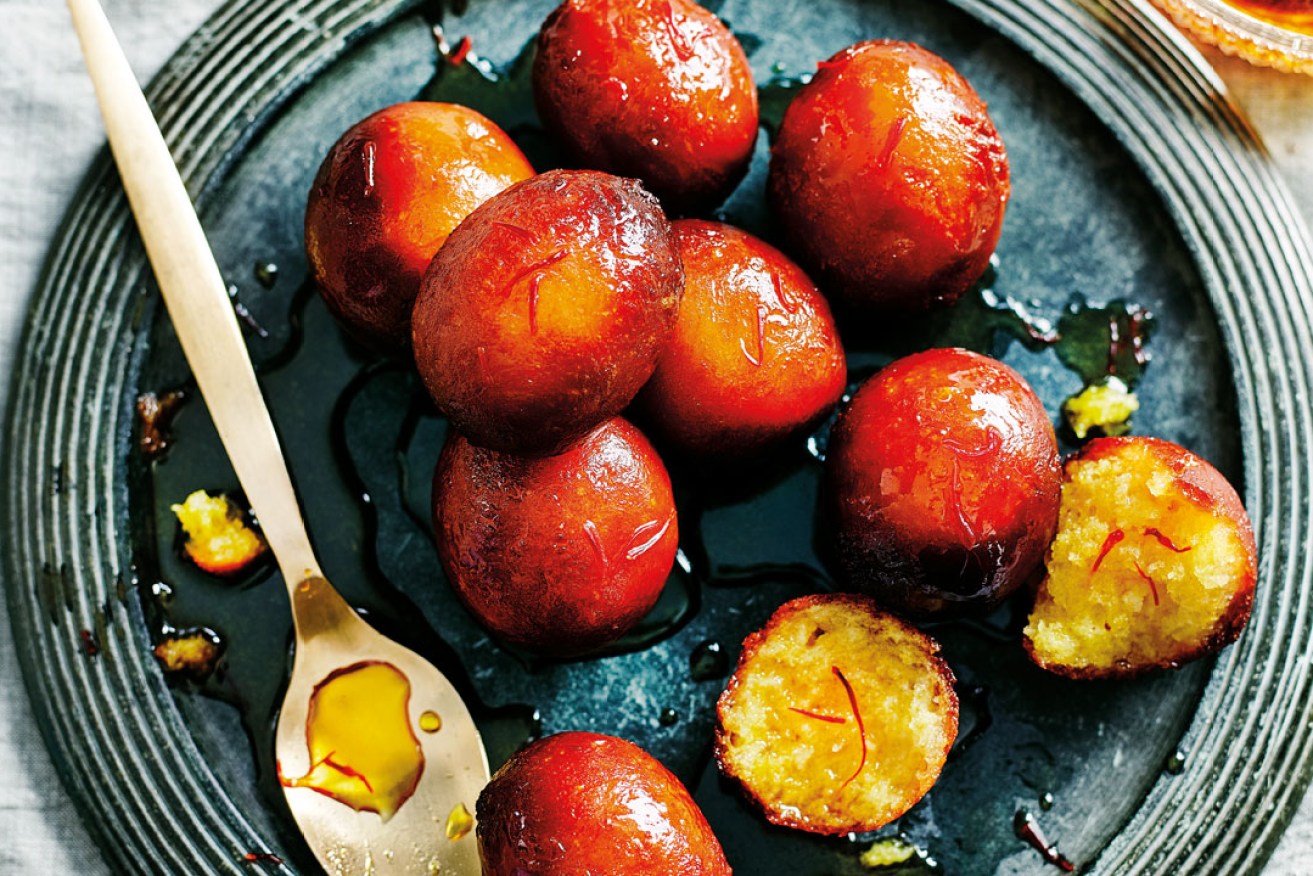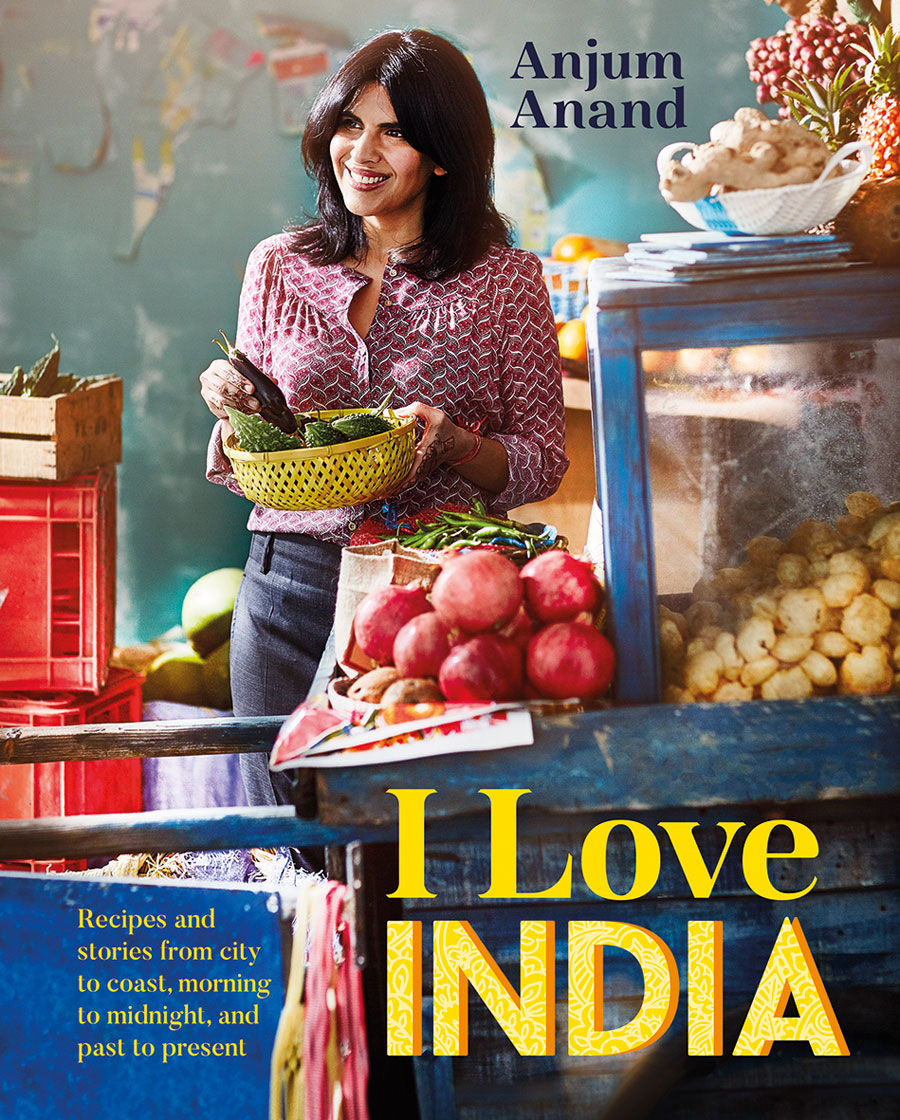Sticky saffron dumplings
These small syrupy doughnuts are a favourite dessert in India, according to Anjum Anand, author of a new book of Indian recipes inspired by her family and travels.

I Love India, published this month, includes stories and snippets of history alongside recipes for dishes ranging from steamed Nepalese meat momos from the dumpling houses of Calcutta and crispy spinach chaats eaten by street stalls in North India, to Portuguese-inspired prawn and coconut cakes found in Goa
London-based Anand, who has presented a cooking show for the BBC and Anjum’s Spice Stories on SBS’s Food Network, writes of her sticky saffron dumplings:
“India has a whole genre of sweet desserts which were once made in the home, but are now mostly made by specialized halvaies – Indian pâtissiers.
“Gulab jamun are one of India’s favourites: little syrupy doughnuts made from thickened milk instead of flour and soaked in sugar syrup rather than stuffed with jam or sweetened in the batter. I use dry milk powder which I rehydrate, not the traditional thickened, solidified milk, as that takes too long and needs too much attention to make.
“There are only two tricks to getting these doughnuts right: the right consistency of dough (not too soft, not too hard); and frying them over a very low heat so they cook all the way to the centre, stirring the oil almost continuously so they brown evenly. I like them warm as they will be softer, and you can reheat them in their syrup, but you can equally eat them cold.
“Serve as they are, or with a little ice cream.”
Sticky saffron dumplings
Makes 18 (serves 1–2 per person)

Recipe and photo from I Love India, by Anjum Anand, published by Hardie Grant Books, $39.99.
Ingredients
For the dumplings:
400ml (1 2/3 cups) whole milk powder (measure it in a measuring cup), plus more if needed
100g (½ cup) plain (all-purpose) flour
2/3 tsp baking powder
2 tbsp ghee, plus more to form the dumplings
5 tbsp plain yogurt
5 tbsp whole milk
Vegetable oil, to deep-fry
Sliced pistachios, to serve (optional)
For the syrup:
450g (scant 2 cups) granulated sugar
650ml (2 2/3 cups) water
2 good pinches of saffron threads
½ – 1 tsp rose water, depending on strength
Method
Mix together the dry ingredients for the dumplings. Spoon in the ghee, yogurt and milk. Mix well with your hands to bring the dough together; it will be moist. Set aside.
For the syrup, heat the sugar, water and saffron together in a saucepan, stirring to help the sugar dissolve. Once boiling, simmer for around 3-4 minutes, then turn off the heat. Add the rose water, using the smaller amount first and tasting until you have a strength you prefer.
Meanwhile, pour 8-10cm of oil into a medium-large karahi, wok or wide saucepan. Heat gently.
Divide the dough in half. Wet some kitchen paper and place on top of the dough you aren’t working with. Grease your palms well with ghee, take half the dough and form it into 9 small balls; I like to make them slightly oval rather than round, but you can shape them as you like. The surfaces should be smooth and crack-free. (If the dough is too soft to shape, add a little milk powder.) Repeat to make and shape the remaining dumplings.
To check if the oil is ready, put a tiny pinch of the dough into the oil. It should only sizzle very slightly. When it is ready, add the balls in batches so as not to crowd the pan, stirring the oil as you put them in.
Cook over a gentle heat, stirring and turning them very often for even browning; they should take 15-17 minutes per batch to reach a lovely golden brown. Once done, take them out with a slotted spoon and place straight into the syrup. Repeat with the next batch.
Cover and leave to soak for 2 hours, or overnight, in the fridge. They should last 10 days or more. Serve as they are, or sprinkle them with sliced pistachios.




